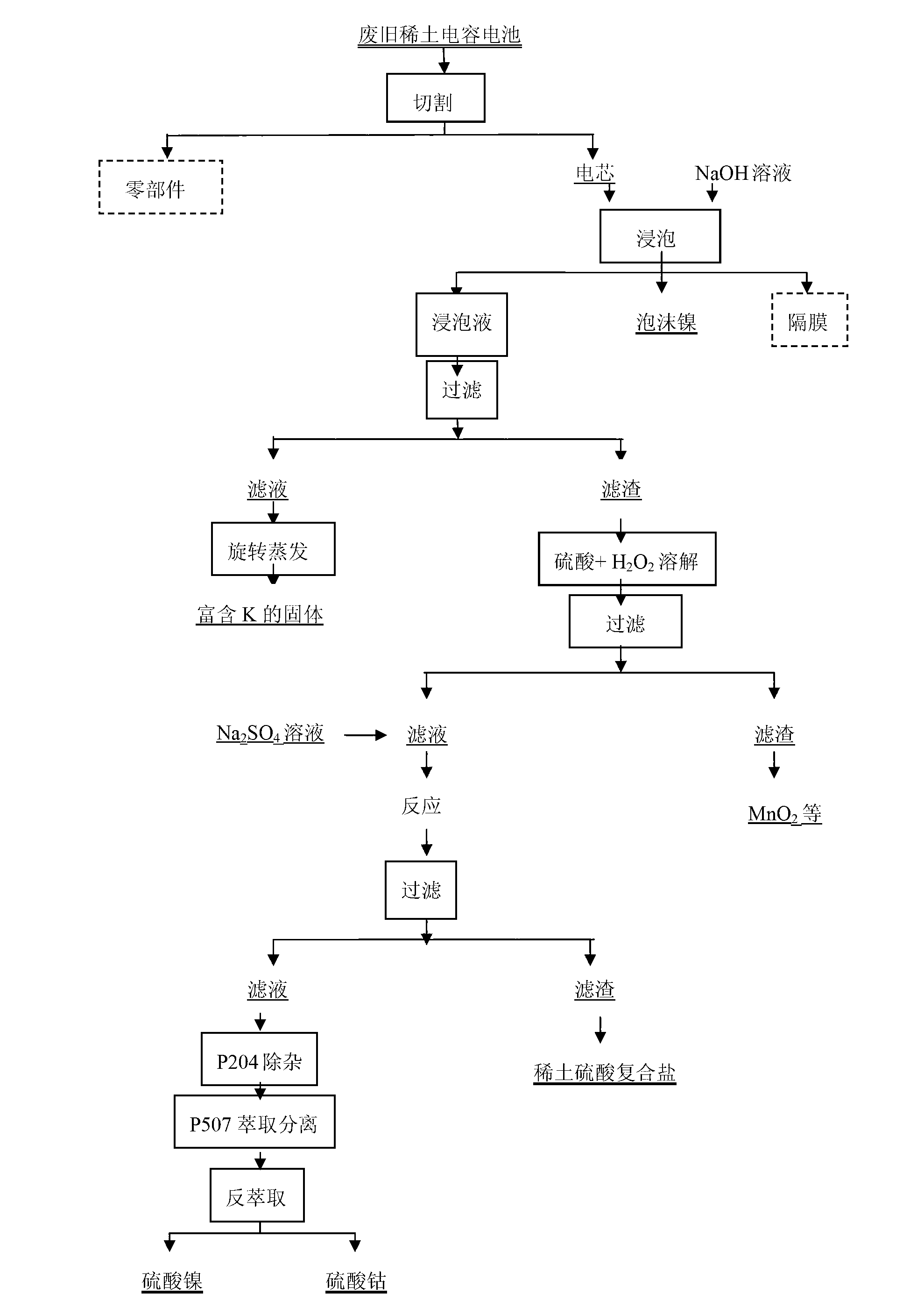Integrated recovery method of waste and old rare earth capacitance battery
A capacitor battery and recovery method technology, applied in the direction of process efficiency improvement, etc., can solve the problems that it cannot be used as a power battery electrode material, the electrochemical performance of nickel hydroxide is general, and the environmental protection of the process is low, so as to achieve low price and particle size distribution Uniformity and high recovery purity
- Summary
- Abstract
- Description
- Claims
- Application Information
AI Technical Summary
Problems solved by technology
Method used
Image
Examples
Embodiment 1
[0046] a. Cut the waste rare earth capacitor battery to separate the batteries and parts:
[0047] Use a laser cutting machine to cut waste rare earth capacitor batteries, take out the battery cells containing the plates and diaphragms, and take out the components including the battery shell, top cover, safety valve, pole, tab, nut, flat gasket and sealing gasket.
[0048] b. Soak the cell in NaOH ultrasonically, and then separate the diaphragm and foamed nickel to obtain the soaking liquid:
[0049] Soak the battery cell and pure water at a mass ratio of 1:0.8, and then add NaOH ultrasonic soak. The ratio of NaOH to pure water is 0.1:1, NaOH is in mol, and pure water is in L. Use 2000W ultrasonic power to ultrasonic 4 times intermittently, the cumulative time is 20min, the immersion temperature is 75℃, and the immersion time is 1h, then take out the foamed nickel of the separated electrode material to clean and dry, take out the diaphragm to clean and dry, and the rest is soaking li...
Embodiment 2
[0058] a. Cut the waste rare earth capacitor battery to separate the batteries and parts:
[0059] Use a laser cutting machine to cut waste rare earth capacitor batteries, take out the battery cells containing the plates and diaphragms, and take out the components including the battery shell, top cover, safety valve, pole, tab, nut, flat gasket and gasket.
[0060] b. Soak the cell with NaOH, and then separate the diaphragm and the foamed nickel to obtain the soaking liquid:
[0061] Soak the cell and pure water at a mass ratio of 1:1, and then add NaOH ultrasonic soak. The ratio of NaOH to pure water is 0.2, NaOH is in mol, and pure water is in L. Use 1000W ultrasonic power to ultrasonic 8 times intermittently, the cumulative time is 30min, the immersion temperature is 40℃, and the immersion time is 3h, then take out the separated electrode material foam nickel and clean and dry, take out the diaphragm to clean and dry, and the rest is soaking liquid.
[0062] c. Filter the soaking l...
Embodiment 3
[0070] a. Cut the waste rare earth capacitor battery to separate the batteries and parts:
[0071] Use a laser cutting machine to cut waste rare earth capacitor batteries, take out the battery cells containing the plates and diaphragms, and take out the components including the battery shell, top cover, safety valve, pole, tab, nut, flat gasket and gasket.
[0072] b. Soak the cell with NaOH, and then separate the diaphragm and the foamed nickel to obtain the soaking liquid:
[0073] The battery cell and pure water are immersed in a mass ratio of 1:1, and NaOH is added for ultrasonic soaking. The ratio of NaOH to pure water is 0.15:1, NaOH is in mol, and pure water is in L. Use 1500W ultrasonic power to perform intermittent ultrasound 6 times, cumulative time 25min, immersion temperature 60℃, immersion time 2h, then take out the foamed nickel of separated electrode material to clean and dry, take out the diaphragm to clean and dry, and the rest is soaking liquid.
[0074] c. Filter th...
PUM
| Property | Measurement | Unit |
|---|---|---|
| thickness | aaaaa | aaaaa |
Abstract
Description
Claims
Application Information
 Login to View More
Login to View More - R&D
- Intellectual Property
- Life Sciences
- Materials
- Tech Scout
- Unparalleled Data Quality
- Higher Quality Content
- 60% Fewer Hallucinations
Browse by: Latest US Patents, China's latest patents, Technical Efficacy Thesaurus, Application Domain, Technology Topic, Popular Technical Reports.
© 2025 PatSnap. All rights reserved.Legal|Privacy policy|Modern Slavery Act Transparency Statement|Sitemap|About US| Contact US: help@patsnap.com

